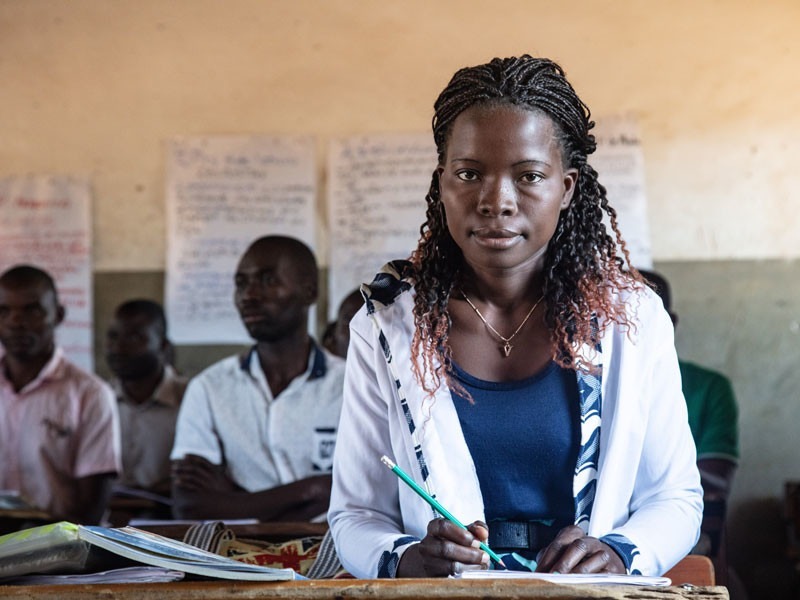Nampula, MozambiqueIn 2018, more than 1,250 teachers have traveled to district centers by motorbikes and minibuses to attend the Vamos Ler! (Let’s Read!) teacher trainings. Jorgina Amisse João Massaula, a Grade 1 teacher at Neôce Primary School in Lalaua District, Nampula, was one of the many teachers eager to make the journey.
“One thing that keeps me going is that every time I attend the face-to-face trainings and school cluster workshops of Vamos Ler! I learn through other colleagues how to improve my reading and writing instruction in Emakhuwa. And I get the chance to share my experiences in the group discussions,” says Massaula.

The five-year Vamos Ler! bilingual early grade literacy program is working closely with Mozambique’s Ministry of Education and Human Development to improve reading and writing skills for more than 800,000 students in over 2,800 schools in the provinces of Nampula and Zambézia. The Vamos Ler! program is funded by the U.S. Agency for International Development, and implemented by Creative Associates International, in close partnership with World Education, Inc., Overseas Strategic Consulting, American Institutes for Research and blueTreeGroup.
With trainings held in January, May and August during the Mozambican school year, Vamos Ler! offers teachers the opportunity to connect with fellow colleagues throughout Nampula and Zambézia. At the trainings, teachers share successes, challenges and ways forward.
Educators of all experience levels gather to learn about innovative approaches that take their instruction to a deeper level, such as adopting a phonics-based teaching approach. It’s the rich content and methodology of the trainings that keeps teachers like Massaula coming back for more.
In the trainings, the teachers have gleaned skills to effectively teach children how to read and write in Emakhuwa, Elomwe and Echuwabo using dynamic techniques that can be easily practiced even in remote and poorly resourced remote schools.
Learning to read starts with the building blocks of phonics
One of the most frequently discussed instructional challenges throughout Mozambique is understanding how to apply the phonics-based approach to teach Bantu language letter-sound correspondence.
The approach builds a child’s ability to identify and manipulate sounds to make linkages between these sounds and the patterns used to form written words. Through this process of breaking down and rebuilding, students begin to learn letter-sound correspondence in their home languages.
Teachers must understand this foundational building block to effectively guide students’ literacy development. Mozambican teachers are new to the phonics-based approach to early grade reading, which creates a steep learning curve to build their students’ phonological awareness and phonics knowledge base.
Although Bantu letter sounds can be challenging for young learners to grasp, Bantu languages have a fairly straightforward letter-sound correspondence.
“We rely on sounds to convey a meaning and to remember things we learn. Therefore, it has become easy to teach our children using the phonics-based approach since it is connecting the sounds that the children can identify and replicate when learning new letter or words,” Massaula emphasizes.
Educators learn how to apply this approach through simulated role play at the Vamos Ler! trainings. Zarera Marcelino, a Grade 1 teacher at Naiculo Primary School in Monapo District, Nampula uses singing to teach local language.
“Singing saves the day and maximizes my efforts to teach letters and sounds. I start reading class each day singing with my students and in the song we use the names and sounds of the letters we have learned,” says Marcelino.
Opportunities like these encourage hands-on practice for teachers prior to integrating the methodologies into daily teaching practice.
As a foundational building block to literacy, understanding how to teach a phonics-based approach is crucial to a student’s developmental growth.
The Vamos Ler! trainings support teachers’ understanding of how to integrate the phonics-based approach into the classroom, equipping educators like Massaula and Marcelino to shape students into lifelong learners who not only learn to read, but read to learn.



